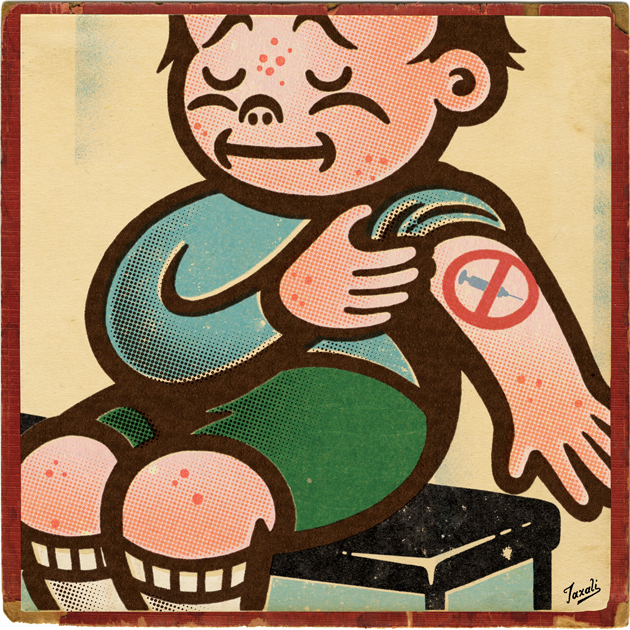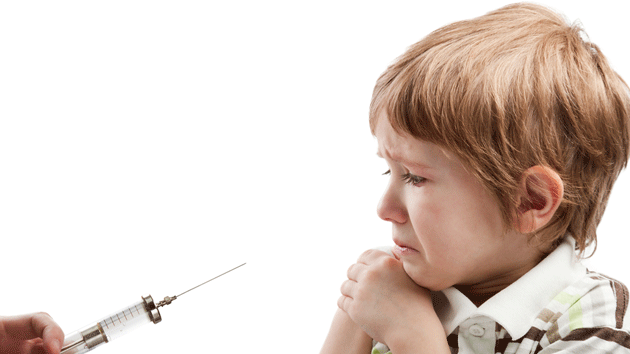In December 2014, an 11-year-old visited a Disney theme park in California and afterward got a rash. It was measles, and over the next several weeks the disease spread to at least 136 Californians, as well as people in seven other states and two foreign countries.
This was no fluke case. Though measles was supposedly eliminated in the United States in 2000—thanks to the highly effective measles, mumps, and rubella vaccine (MMR)—it has come roaring back, with 667 confirmed cases nationwide in 2014 alone.
Among the California patients in the Disney outbreak, at least 36 percent hadn’t received their MMR vaccine. Some were too young to have gotten their shots, but more than half were unvaccinated by choice. Despite school requirements, it was easy to skip immunizations: All parents had to do was sign a form stating that “immunization is contrary to my beliefs.” From 1996 to 2014, the rate of kindergartners with personal-belief exemptions more than quintupled. And this wasn’t just a California phenomenon: 47 states allow religious or personal-belief exemptions.
But California is no longer among them. The Disney outbreak propelled state lawmakers to pass SB 277, which eliminated the personal-belief exemption. It has been an immunological home run: In the 2016-17 school year, 95.6 percent of Californian kindergartners received all their required vaccinations, the highest rate since current immunization requirements began in 2001.
But while the number of personal-belief exemptions has plummeted, medical exemptions—which require the signature of a licensed physician—have risen. Writing in the Journal of the American Medical Association in September, researchers found that over the last two school years, the rate of permanent medical exemptions for kindergartners tripled. The rate, which had hovered around 0.15 percent for nearly two decades, is now 0.51 percent.
Half of 1 percent might not seem like much, but it isn’t evenly distributed. In more than two dozen public schools across the state—almost all of them charter schools—more than 10 percent of students in kindergarten or seventh grade (another year when the state surveys) had a permanent medical exemption, or PME, last school year. Yuba River Charter School, about an hour’s drive west of Lake Tahoe in rural Nevada City, had PMEs for 16 percent of kindergartners and 30 percent of seventh-graders. SunRidge School in Sebastopol, a town in Sonoma County, had PME rates of 39 percent and 36 percent, respectively. The previous year, neither school had any medical exemptions. Their vaccination rates are comparable to Haiti’s.
Fueling this spike in medical exemptions is an industry of doctors willing—and sometimes eager—to flout the recommendations of the Centers for Disease Control and Prevention in the name of “parent choice.” Led by Orange County pediatrician Bob Sears, author of the influential The Vaccine Book and son of pediatrician and attachment parenting guru Bill Sears, many physicians are wary of the CDC’s vaccination schedule, believing that giving kids too many vaccines at once may be dangerous. (In 2013, the Institute of Medicine found no evidence that the schedule was unsafe.) The doctors are supported by a movement of anti-vaccine parents, many of whom believe the MMR vaccine causes autism. That view is rooted in a 1998 paper that was later retracted by The Lancet and declared “an elaborate fraud” by the British Medical Journal.
But the damage has been done. In 2015, soon after SB 277 was passed, a California-based nonprofit popped up called Physicians for Informed Consent (PIC). A coalition of about 200 doctors, scientists, and attorneys who vehemently oppose mandatory vaccine laws, it boasts Sears as a founding member. Meanwhile, Sears is currently facing charges of gross negligence from California’s medical board. The board has alleged that when granting a medical exemption for a two-year-old, Sears failed to obtain the patient’s medical history and other necessary information. Depending on which way the board rules, Sears could have his license revoked. (Sears declined to comment on his case.)
PIC’s membership is confidential, but its list of founding members and board members is public. I called many of those doctors’ offices and asked what I would need to do to secure a medical exemption. One clinic outside Los Angeles said I would just have to complete a genetic test. When I asked which conditions merited an exemption, some offices said there was a long list of conditions that would qualify; one office assistant said her thyroid problem had secured a medical exemption for her kid.
According to Kathryn Edwards, a professor of pediatrics at Vanderbilt University, using such tests is not “scientifically sound.” She adds, “There really are not specific genetic markers for telling us when patients are going to have adverse events associated with vaccines.” Shira Miller, PIC’s president, wrote to me in an email that her organization strives to make sure its doctors give medical exemptions “in accordance with California law.”
To be sure, there are medical conditions that do merit an exemption. Children whose immune systems are compromised might not be able to handle vaccines. But, by Edwards’ estimate, kids with a legitimate need for a medical exemption account for just 1 percent of the population—tops. There’s no way that 10 or 25 percent of kindergartners in a single school have a valid reason.
“I don’t want children to get vaccines who shouldn’t be getting vaccines,” says Edwards, but “I’ve stood at the bed of children who are dying. I know that if there was a vaccine that could have prevented that, the family would have wanted that.”













